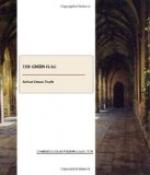So they flashed at each other as the one side waited and the other passed. Then there came a rolling murmur swelling into a shout, and a great brake with four horses came clattering along, all streaming with salmon-pink ribbons. The driver wore a white hat with pink rosette, and beside him, on the high seat, were a man and a woman-she with her arm round his waist. Montgomery had one glimpse of them as they flashed past; he with a furry cap drawn low over his brow, a great frieze coat and a pink comforter round his throat; she brazen, red-headed, bright-coloured, laughing excitedly. The Master, for it was he, turned as he passed, gazed hard at Montgomery, and gave him a menacing, gap-toothed grin. It was a hard, wicked face, blue-jowled and craggy, with long, obstinate cheeks and inexorable eyes. The brake behind was full of patrons of the sport-flushed iron-foremen, heads of departments, managers. One was drinking from a metal flask, and raised it to Montgomery as he passed; and then the crowd thinned, and the Wilson cortege with their dragoons swept in at the rear of the others.
The road led away from Croxley, between curving green hills, gashed and polluted by the searchers for coal and iron. The whole country had been gutted, and vast piles of refuse and mountains of slag suggested the mighty chambers which the labour of man had burrowed beneath. On the left the road curved up to where a huge building, roofless and dismantled, stood crumbling and forlorn, with the light shining through the windowless squares.
“That’s the old Arrowsmith’s factory. That’s where the fight is to be,” said Wilson. “How are you feeling now?”
“Thank you, I was never better in my life,” Montgomery answered.
“By Gad, I like your nerve!” said Wilson, who was himself flushed and uneasy. “You’ll give us a fight for our money, come what may. That place on the right is the office, and that has been set aside as the dressing and weighing room.”
The carriage drove up to it amidst the shouts of the folk upon the hillside. Lines of empty carriages and traps curved down upon the winding road, and a black crowd surged round the door of the ruined factory. The seats, as a huge placard announced, were five shillings, three shillings, and a shilling, with half-price for dogs. The takings, deducting expenses, were to go to the winner, and it was already evident that a larger stake than a hundred pounds was in question. A babel of voices rose from the door, The workers wished to bring their dogs in free. The men scuffled. The dogs barked. The crowd was a whirling, eddying pool surging with a roar up to the narrow cleft which was its only outlet.
The brake, with its salmon-coloured streamers and four reeking horses, stood empty before the door of the office; Wilson, Purvis, Fawcett and Montgomery passed in.




